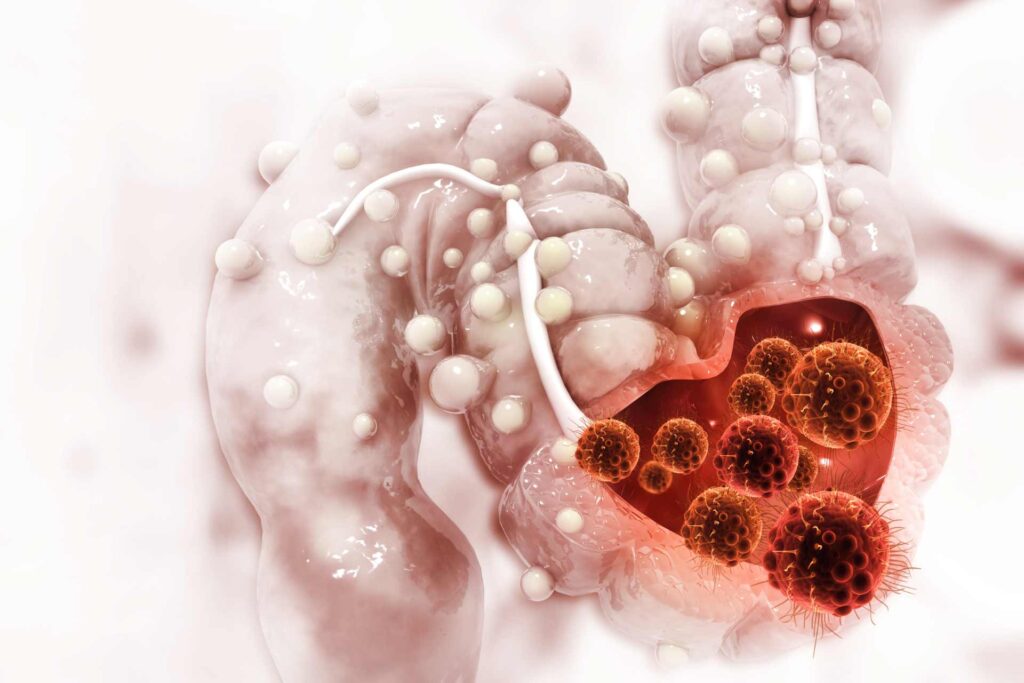What is already known on this topic
Colorectal cancer is the third most common cancer and among the most significant causes of cancer mortality. Previous research has identified alterations of the intestinal microbiota in people with colorectal cancer, but whether and how gut microbes and their metabolites influence cancer growth remains unknown.
What this research adds
By analyzing stool samples from colorectal cancer patients and mouse models of the disease, researchers have found that the levels of the gut microbe Lactobacillus reuteri and its main metabolite, reuterin, are reduced in colorectal cancer. Further experiments showed that reuterin can decrease the proliferation and survival of colon cancer cells by inhibiting key cellular processes such as protein translation. Giving L. reuteri to mice diminishes tumor growth and increases the levels of tumor reactive oxygen species — highly reactive chemicals that can cause damage to the basic building blocks of cells.
Conclusions
The findings suggest that Lactobacillus reuteri can protect against colorectal cancer through its metabolite reuterin.
Colorectal cancer is the third most common cancer and among the most significant causes of cancer mortality. Now, a study in mice and people with colorectal cancer shows that the gut microbe Lactobacillus reuteri can reduce tumor growth.
The results, published in Cancer Cell, suggest that Lactobacillus reuteri can protect against colorectal cancer through one of its metabolites. “Our findings identify that a healthy microbiome and specifically L. reuteri is a potential probiotic approach to treat colorectal cancer,” the researchers say.
Previous work has identified alterations of the intestinal microbiota in people with colorectal cancer, but whether and how gut microbes and their metabolites influence cancer growth remains unknown.
To address this question, researchers led by Yatrik Shah at the University of Michigan analyzed stool samples from colorectal cancer patients and mouse models of the disease.
Inhibiting colorectal cancer
The team found that the commensal Lactobacillus reuteri and its main metabolite, reuterin, were reduced in people and mice with colorectal cancer compared to healthy controls. The levels of other Lactobacilli, such as Lactobacillus acidophilus, were also reduced in these samples.
The researchers found that reuterin and L. reuteri levels were decreased in tumor tissues compared with adjacent normal tissues, and experiments on colon cancer cells grown in a dish showed that reuterin can induce cell death in tumor cells, as well as inhibit their growth.
Further tests revealed that reuterin kills cancer cells by inhibiting key cellular processes, including protein translation, and producing reactive oxygen species within the tumor environment. Reactive oxygen species are highly reactive chemicals that can cause damage to the basic building blocks of cells.
Promising target
Next, the team set out to test whether reuterin could inhibit colorectal cancer growth in living mice. The animals were first implanted with tumors and then given every day a reuterin-producing L. reuteri strain or a strain genetically engineered to not produce reuterin.
Reuterin and reactive oxygen species were increased in tumors from mice treated with reuterin-producing L. reuteri, the researchers found. In these animals, the team also observed reduced tumor growth and less invasive lesions compared to control mice.
L. reuteri is currently being studied in clinical trials for several conditions, including colitis, asthma, and Helicobacter pylori infection, the authors note. The current findings, they add, make L. reuteri a promising target also for clinical studies on colorectal cancer, in addition to traditional treatment or as a preventive strategy. “Our work further highlights the utility of a precision approach to probiotics,” the authors say.











